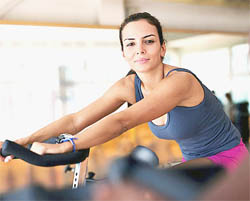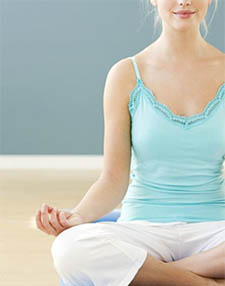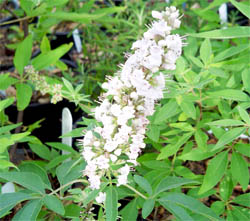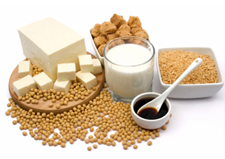|
|
Top 10 to revive your sex drive during menopause
 There
a innumerable factors involved with drop down in sex drive during perimenopause
and menopause. Besides, the female sex drive is multifactorial, the desire to
make love is not only influenced by physical issues, but emotional ones as well. Once a woman stops ovulating, she tends to automatically lose the regularly scheduled boost in her sex drive that has been present since puberty (just before ovulation ). Around menopause, there is less estrogen circulating in your body, that can bring a drop in your sex drive. Without it, not only can desire take a dive, vaginal tissue begins to dry and shrink. As a result, intercourse can become uncomfortable, or even painful. Avoiding sex because of pain only leads to more pain. Women tend to be caught in a vicious cycle. There
a innumerable factors involved with drop down in sex drive during perimenopause
and menopause. Besides, the female sex drive is multifactorial, the desire to
make love is not only influenced by physical issues, but emotional ones as well. Once a woman stops ovulating, she tends to automatically lose the regularly scheduled boost in her sex drive that has been present since puberty (just before ovulation ). Around menopause, there is less estrogen circulating in your body, that can bring a drop in your sex drive. Without it, not only can desire take a dive, vaginal tissue begins to dry and shrink. As a result, intercourse can become uncomfortable, or even painful. Avoiding sex because of pain only leads to more pain. Women tend to be caught in a vicious cycle.
Decreased libido is thought to be due to lowered levels of
estrogen, progesterone, and testosterone present in your body during
menopause. Each of these
hormones has a specific role to play in making you experience sexual desire.
Estrogen helps you to feel heightened sensitivity during sexual intercourse.
Progesterone keeps your libido up. Testosterone, a male sex hormone, boosts
sexual desire and lubricates your vagina. When these hormones drop, so does your
overall desire for sexual intercourse. Besides, surfacing symptoms like vaginal
dryness, depression,
appearance, fatigue all add
up to the problem.
Before opting for hormonal therapy or along with therapy, do try these
options to revive your sex life during menopause.
 Take
a diet rich in vitamins and phytoestrogen:
B-Complex Vitamins � vitamins B-1, B-2 and B-3 are necessary for healthy sex
drive. You can find vitamin B-1 in grains and nuts. Vitamin B-2 is found in
bananas, broccoli and lean meats. Vitamin B-3 creates improved blood flow and is
important for sex hormones and to increase sexual desire. Vitamin E helps with
sex hormone production and improves circulation - it is found in whole grains,
fruits and vegetables. A wealth of research in recent years has shown that a
regular intake of
phytoestrogens throughout the day can play a useful part in a menopause
control programme in a similar way to HRT. In fact, although phytoestrogens are
only about 1/1000th as potent as animal-based estrogen, they are fast becoming
known as great hormone regulators owing to their balancing effects on estrogen
levels. Two particular forms of phytoestrogen are useful in controlling
menopausal symptoms. They are: isoflavones, found in
soya products and red clover;
and lignans found in
flaxseeds (linseeds). Take
a diet rich in vitamins and phytoestrogen:
B-Complex Vitamins � vitamins B-1, B-2 and B-3 are necessary for healthy sex
drive. You can find vitamin B-1 in grains and nuts. Vitamin B-2 is found in
bananas, broccoli and lean meats. Vitamin B-3 creates improved blood flow and is
important for sex hormones and to increase sexual desire. Vitamin E helps with
sex hormone production and improves circulation - it is found in whole grains,
fruits and vegetables. A wealth of research in recent years has shown that a
regular intake of
phytoestrogens throughout the day can play a useful part in a menopause
control programme in a similar way to HRT. In fact, although phytoestrogens are
only about 1/1000th as potent as animal-based estrogen, they are fast becoming
known as great hormone regulators owing to their balancing effects on estrogen
levels. Two particular forms of phytoestrogen are useful in controlling
menopausal symptoms. They are: isoflavones, found in
soya products and red clover;
and lignans found in
flaxseeds (linseeds).

Review current medications and medical
conditions- Many prescription medications � including
antidepressants, blood pressure
medications and chemotherapy drugs � are notorious libido killers.
Antihistamines also can diminish your sex drive.
Although one cannot do away with these medications you can try homeopathy
and dietary modification to minimize the side effect of these drugs.
  Adjust
lovemaking activities. Try warm baths before genital sexual activity, extend
foreplay, incorporate
massages,
change your sexual routine, experiment with positions, discuss sexual fantasies.
All these activities will promote relaxation and eliminate anxiety. Also,
by experimenting different positions you can minimize any pain you may be
experiencing by controlling the depth of penetration. Burning essential oils,
such as jasmine, rose, ylang ylang, clary sage or sandalwood, may heighten your
enjoyment. Adjust
lovemaking activities. Try warm baths before genital sexual activity, extend
foreplay, incorporate
massages,
change your sexual routine, experiment with positions, discuss sexual fantasies.
All these activities will promote relaxation and eliminate anxiety. Also,
by experimenting different positions you can minimize any pain you may be
experiencing by controlling the depth of penetration. Burning essential oils,
such as jasmine, rose, ylang ylang, clary sage or sandalwood, may heighten your
enjoyment.

Use
lubrication. Using lubricants during sex can make intercourse less painful
and more enjoyable. Though lubricants will not provide long-term relief for your
low libido, it can provide temporary relief. Today�s modern, sensual,
water-based lubricants can actually enhance sex in addition to making it more
comfortable. For example, Play More Lubricant provides women with a smooth,
slick feeling that is not sticky and feels natural.
  Exercise
most days of the week- Menopausal women experience pain during intercourse
because the vaginal tissues become less elastic, drier and thinner. Furthermore,
appetite for sex is greatly decreased because of the decline in clitoral
sensitivity. One way to boost sexual pleasure and tissue elasticity is by
regularly performing
Kegel
exercises, which was designed by Dr. Arnold Kegel. If you want to see
dramatic improvement in your sexual pleasure and vaginal elasticity, you need to
perform these exercises regularly, not less than five times a day. Shoot
for 3 or 4 days of cardio exercise like running, walking, swimming or any
activity you enjoy. Don't forget that sex burns calories. Sure, it has to be
fairly vigorous to get your heart rate going, but a 130-lb person can burn about
seven calories per five minutes of vigorous sex. Keep it up for an hour, and
you'll burn off 88 calories...not bad for having a little fun, plus, you will
impress your mate with your incredible endurance. Exercise
most days of the week- Menopausal women experience pain during intercourse
because the vaginal tissues become less elastic, drier and thinner. Furthermore,
appetite for sex is greatly decreased because of the decline in clitoral
sensitivity. One way to boost sexual pleasure and tissue elasticity is by
regularly performing
Kegel
exercises, which was designed by Dr. Arnold Kegel. If you want to see
dramatic improvement in your sexual pleasure and vaginal elasticity, you need to
perform these exercises regularly, not less than five times a day. Shoot
for 3 or 4 days of cardio exercise like running, walking, swimming or any
activity you enjoy. Don't forget that sex burns calories. Sure, it has to be
fairly vigorous to get your heart rate going, but a 130-lb person can burn about
seven calories per five minutes of vigorous sex. Keep it up for an hour, and
you'll burn off 88 calories...not bad for having a little fun, plus, you will
impress your mate with your incredible endurance.
  Consume
alcohol moderately A glass of wine may make you feel amorous, but too much
alcohol can spoil your sex
drive; the same is true of street drugs. Too much alcohol can delay a woman�s
orgasm. This can add to the sexual side effects already experienced in later
life. Alcohol aggravates
flushes, insomnia
and, in excess, can worsen or cause many nutritional deficiencies at a time when
you need to be conserving essential nutrients. Consume
alcohol moderately A glass of wine may make you feel amorous, but too much
alcohol can spoil your sex
drive; the same is true of street drugs. Too much alcohol can delay a woman�s
orgasm. This can add to the sexual side effects already experienced in later
life. Alcohol aggravates
flushes, insomnia
and, in excess, can worsen or cause many nutritional deficiencies at a time when
you need to be conserving essential nutrients.
  Commit
to new stress-management practices, like acupuncture, biofeedback, or yoga-
Research has found that most women who participated in different acupuncture
studies found relief from menopausal symptoms including, Hot flashes, insomnia,
stress, anxiety and vaginal dryness.
Yoga increases flexibility in the
body. Also it tones the body muscles and providing the body the strength to
improve the sexual experience. With
flexibility,
you can enjoy, discover and perform new and more exciting sexual positions. Commit
to new stress-management practices, like acupuncture, biofeedback, or yoga-
Research has found that most women who participated in different acupuncture
studies found relief from menopausal symptoms including, Hot flashes, insomnia,
stress, anxiety and vaginal dryness.
Yoga increases flexibility in the
body. Also it tones the body muscles and providing the body the strength to
improve the sexual experience. With
flexibility,
you can enjoy, discover and perform new and more exciting sexual positions.
 
Talk to your partner- tell your partner about your symptoms, how they
are affecting the way you experience sex, and what you both can do to improve
your sex life (choose a time when both of you are relaxed). Stress incontinence
might occur during lovemaking for some women. The best thing you can do if you
are concerned about this is talk with your partner. Your partner is more likely
to be accepting of the situation and help you feel comfortable if something like
this were to happen if you are honest with them from the start. Sharing your
concerns will also eliminate any unexpected 'surprises' during lovemaking, so
that a little incontinence doesn't become a big deal. So many fluids are
exchanged during sex anyway a little incontinence is likely to get lost in the
throws of passion.
  Try
Supplements: Unless your menopausal symptoms are severe, you actually do not
need
HRT. Instead of taking this artificial hormone replacement treatment, it may
be better to just take Black Cohosh and Chasteberry supplements. Black Cohosh is
effective in maintaining the normal levels of estrogen in your body. As a
result, most of the symptoms that are related to hormonal imbalance can be
reduced. Another herb that can make a tremendous effect in correcting hormonal
imbalance and vaginal changes is Chasteberry. An all-natural supplement that can
also help boost your sex drive is Zalestra, which contains Black Cohosh, Green
Tea extracts, and other nutrients that are helpful in reducing menopausal
symptoms. Try
Supplements: Unless your menopausal symptoms are severe, you actually do not
need
HRT. Instead of taking this artificial hormone replacement treatment, it may
be better to just take Black Cohosh and Chasteberry supplements. Black Cohosh is
effective in maintaining the normal levels of estrogen in your body. As a
result, most of the symptoms that are related to hormonal imbalance can be
reduced. Another herb that can make a tremendous effect in correcting hormonal
imbalance and vaginal changes is Chasteberry. An all-natural supplement that can
also help boost your sex drive is Zalestra, which contains Black Cohosh, Green
Tea extracts, and other nutrients that are helpful in reducing menopausal
symptoms.
 Educate
Yourself: about your anatomy, sexual function, and the normal changes
associated with aging, as well as sexual behaviors and responses. This may help
you overcome your anxieties about sexual function and performance. Educate
Yourself: about your anatomy, sexual function, and the normal changes
associated with aging, as well as sexual behaviors and responses. This may help
you overcome your anxieties about sexual function and performance.
Going through menopause can be exhausting. Feeling good about yourself when
everything is changing, from your waistline to your sex life, can be
challenging. Often, non-hormonal options may rescue a lagging libido and spice
up your sex life. Reduced need for sex and a declining drive are not medical
problems -- and if they don't cause you distress, there is no need to seek
treatment.
The best medicine for women during menopause is to have a positive
attitude, a strong support system already established. An understanding
supportive partner, children who know and accept what is happening, and other
women friends who may be at the same stage of their lives � these factors will
make the transition a helluva lot easier and let you get on with it!
Eat 100mg of phytoestrogens each day. Consume foods that are
rich in phytoestrogens little and often over the course of the day.
These include:
 Isoflavones: Isoflavones:
soya milk
soya beans
tofu
soya flour
soya nuts
Lignans
flaxseeds (linseeds)
sesame seeds
sunflower seeds
pumpkin seeds
beans and lentils
chickpeas
mung beans
alfalfa
red clover
almonds
green and yellow vegetables
|
Dated 08 December 2011
Related Links
|
|
|
|
|









